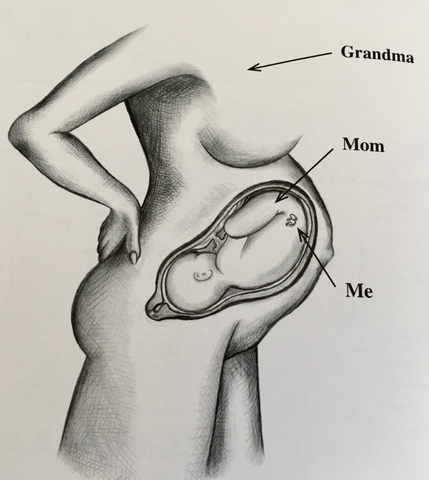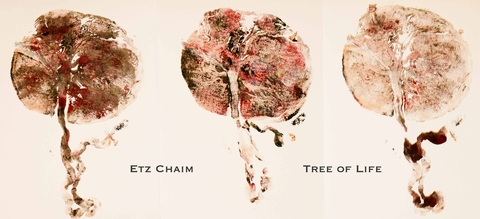A Doula Diary: On Magic & Placentas
I read Annie Ernaux’s autobiographical novella, and watched its movie adaptation, L'événement, in the same week. The story is simple: a young French woman narrates her experience with abortion when it was still illegal in France in the 60’s. Reading the novella was painful, but as a feminist, it felt necessary to learn about this recent history that is still a present reality for many women around me. The story spares no details. Through the protagonist’s journal entries, we feel a cold, distant worry as she waits for the red spot to appear on her underwear. Month after month, the stress of a growing belly leaves us dissociated, waiting for the problem to disappear, and hoping for a miracle to happen. As a writer, Annie’s language struck me with its simplicity. Her narration of the events almost felt factual, like she was not the one going through such an excruciating experience. The heaviness of her womanly1 body was carried with rejection; a refusal to accept the growth inside her flesh and a resistance against the changes it could cause outside the limits of her body. The fear and despair that led the protagonist to insert a needle in her body sent shivers down my spine. Her words haunted me, I read them and cried.
Watching the movie was a different journey. The visceral and raw footage of the abortion process left people twitching in their seats. I could feel the tension in the bodies of the few men sitting around me inside the cinema hall. The women felt calmer, or perhaps they were just more knowing. Showing the realities of a story often left untold and silenced felt urgent. I could not directly tell how I felt. The ominous music reflected the anger lingering in the body of the protagonist. The movie’s slow pace poked my impatience and left me furious at the lack of choices women have and the absurdity of it all. The tears froze in my eyes before I could release them. She wanted to get rid of this pregnancy and I refused to victimize her. It was a scene of a hanging cord, with an aborted being at its end and a placenta planted at its beginning, that made me realize how I felt: I was curious. I wondered how an umbilical cord, a tube of blood vessels, came to signify an emotional connection and an unbreakable bond between mother and baby in my head.
Describing the movie, I caught myself calling it a story narrating and describing death. My face muscles tensed in shock; I could almost hear the feminist within me scream in embarassment. Had I just called abortion death? Where was this pro-life rhetoric coming from? Was this another remnant of internalized sexism I needed to unlearn? In the shape of a separate thought, an answer started to form. One year ago, I took the training necessary to become a childbirth doula. Over the past year, I have been grappling with doubts and fears of this new profession of mine. A doula validates, holds space, witnesses, and serves. The profession seems to be celebrating life; that of the baby of course, but more so of the female body carrying, sustaining, and nourishing it. I, again, thought of the placenta planted like a seed inside of a growing belly.
Something felt off and I could not pinpoint it. I remembered a powerpoint slide from the training I received: it was a drawing of a pregnant woman carrying a female fetus. The explanation went as follows: your life on earth started inside that of your grandmother. Nothing shocking here, just simple biology: a female fetus develops all the eggs she will ever have when she is still inside of her own mom’s body. As a fetus, your mother had all the eggs she would need inside her ovaries, and one of those eggs would develop into you. During the session, we marveled at the divine and sacred female connection that transcends through generations; the sisters and the aunts have all lived together in the swollenness of a grandmother. Lived. Life.

Something felt off and I still could not pinpoint it. That dreamy imagination burst when I learnt that this connection does not apply when the fetus is that of a male body that carries no ovaries and has no eggs. My feelings were valid and I could finally pinpoint it when my partner questioned me, asking: why are you calling an ovum life? Ovum. Egg. Embryo. Fetus. Baby. When does an ovum become an embryo and when does an embryo become a life? During the past year, I attended two births. The closer I got to life, the more I thought about the ways it ended. It did not help that three weeks after the first birth I attended, my father passed away. My doula journey has been bumpy and I have not yet been able to fully grasp its complexities. When I attended the second birth, I felt immense loneliness. Was it a feeling of invisibility? Was it worry over the inevitable shortcomings a job so intimate would always entail? My presence has to strike a balance that supports but does not take over; advocates but does not speak for; grounds and centers no matter what happens around or within. The responsibility felt heavier than usual; in hopes of cheering myself up, I went back home to my journal and read what I wrote after the first birth I attended:
It felt natural to be there, to exist in that space. I felt so much tenderness towards the mother. I found myself holding her hands and stroking her head. She had such a peaceful smile and looked almost shocked when she saw her baby. I felt overwhelming softness the second I saw this little thing, coated with vernix and blood. Today reminded me of life. Life will continue whether I am here or not. I want to remember the placenta.
Every time I think about this new profession of mine, my mind keeps going back to the magic of the placenta. I smile at the thought of its other name: the tree of life. An organ that develops with pregnancy; it attaches itself to the uterus, provides life to the growing fetus through oxygen and nutrients, and finally dies with the end of its purpose. It is an organ that appears and disappears, that is vital, yet disposable. I believe we can still think of the placenta as a sacred connection between mother and baby, but perhaps we can also see it as a form of life loving itself in all of its forms. Think of the wisdom of that wizard organ that connects the two bodies; yet keeps them at a distance, as two different entities.
I look at this now and think of what it means to be a feminist doula. As a feminist, I question, analyze, and envision new possibilities and more just realities. As a doula, I validate, offer space, and honor the birthing person’s autonomy and needs. Both roles require slowing down in a system that accelerates and dehumanizes. I no longer believe I am a guard of a sacred secret, nor a witness to the creation of life. I do still believe that my role is to accompany and to provide the space needed for the birthing person to hear their inner voice, to trust their gut feelings, their bodies, and their intuition, and to give their consent at every single step of the way. Being a doula means to witness transitions in all of their diversity and all of their forms. Doulas do not only work with childbirth, there are doulas who assist with miscarriages, abortions, hospicing, and sexual and gender transitions. When I am asked what it means for me to be a doula, my new answer will be in Arabic: رفيقة.
----
Mariam Diefallah is a feminist writer and doula from Egypt. She is a strong advocate for better sexual and reproductive health and rights and is a passionate believer in pleasure as a form of activism. Her work has been published in Jadaliyya, Jeem, Asymptote, and Egypt Migrations.
- 1The words woman and female are used in the text to highlight the cultural and social values and gender roles the society attach to being a pregnant woman. In my work as a doula, I work with and support all birthing people.
